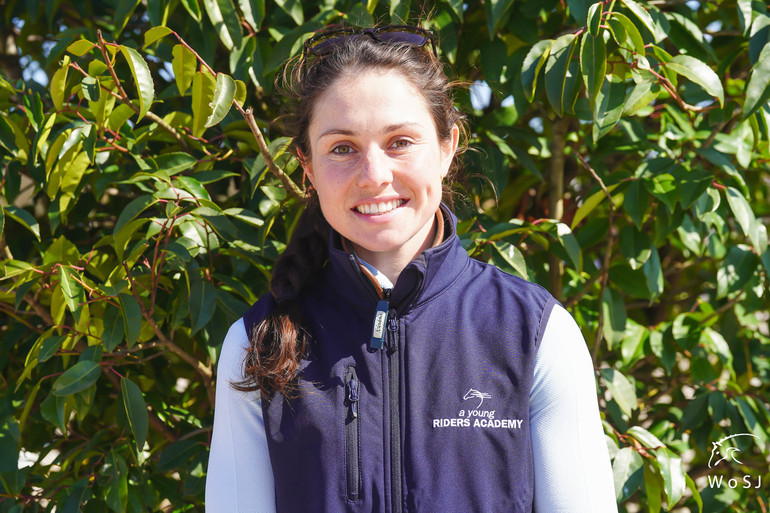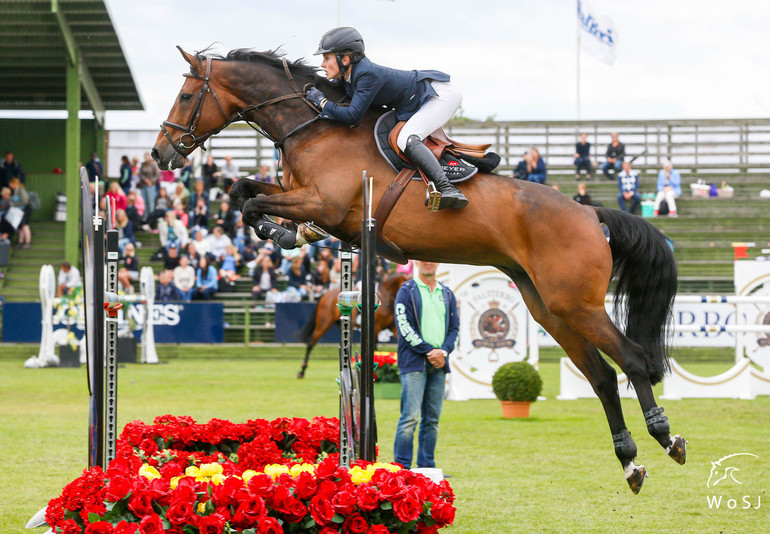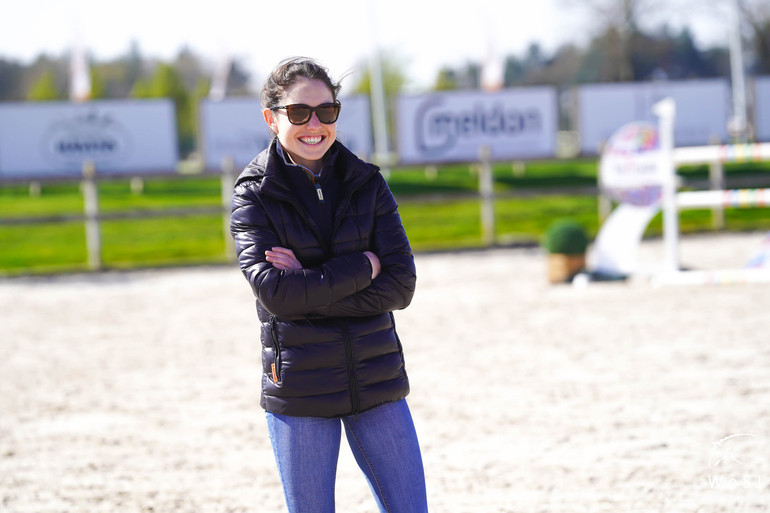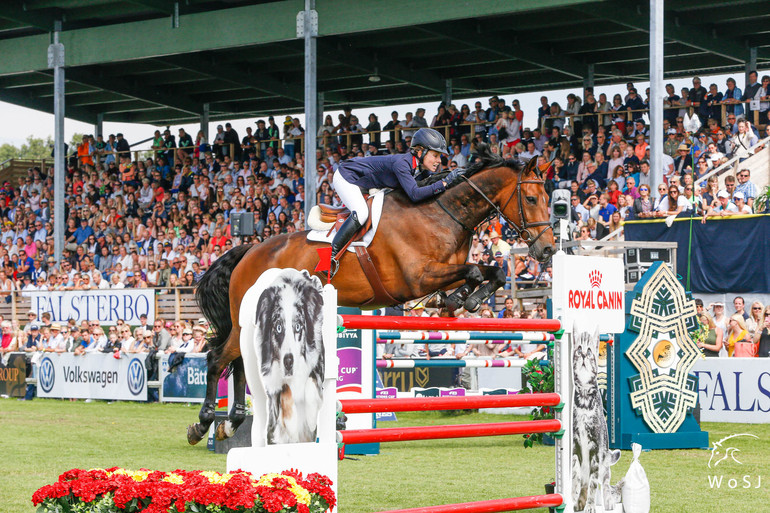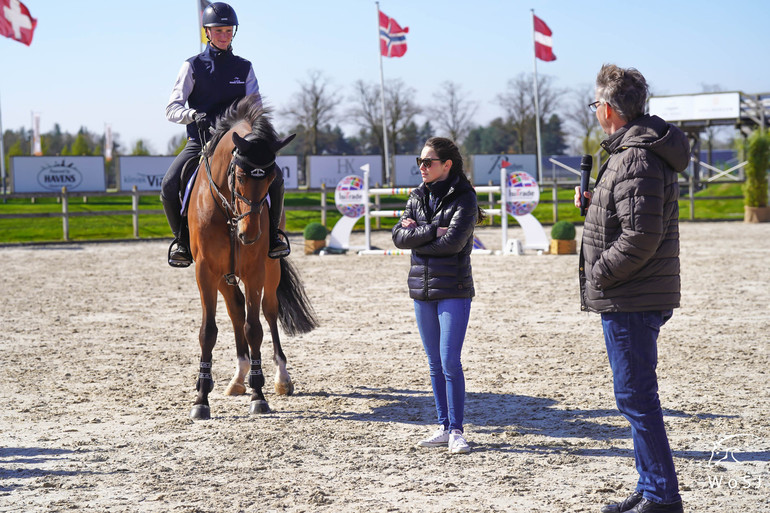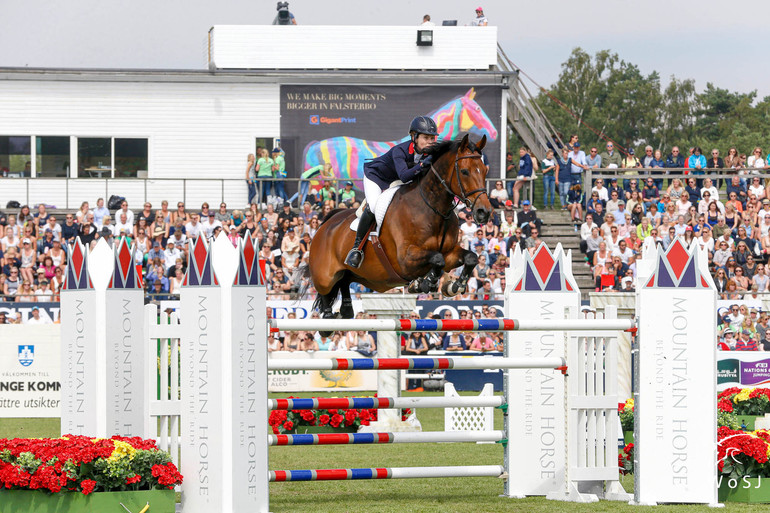Text © World of Showjumping
“As riders, we have to remember that we – just as our horses – are athletes, and being fit will give us longevity in the sport,” Emma O’Dwyer – a physiotherapist and a professional showjumper – tells World of Showjumping. “You work as a unit with your horse and when you make yourself better, you improve your horse as well.”
Despite being one of the most talented young riders in Ireland, the now 28-year-old was encouraged by her parents to pursue an education alongside her riding career, which led her to physiotherapy studies on a sports scholarship at the University College Dublin. Today, Emma runs her own clinic at home in Kilkenny, Ireland, treating her patients in the evenings after a full day in the stables where she produces young horses towards higher levels. Emma also works with the Young Riders Academy (YRA) as a physiotherapist – having herself been a part of the YRA-family in 2016 as a young rider.
Mixing horsemanship with the business side of our sport
“Back then, I had two very good horses, HHS Figero (Guidam x Cavalier Royale) and Echo de Laubry (Virus de Laubry x Feo de Lauzelle),” Emma tells about her young rider years. “In 2016, I was selected for the Young Riders Academy after trials at a show in Germany. I still remember getting the phone call from Sven a couple of weeks later: I was on my way into an anatomy exam, and I saw his name on the screen of my phone and thought I had to take this call. It was incredible to be selected; I was so happy to be a part of such a prestigious academy. The education they provided was really informative from points of view that you never would have thought about as a young rider, because so often so much is done for you. As an example, my parents were brilliant and I had nice owners; a lot was organized for me.”
“My parents taught me all about horsemanship; they taught me how you have to understand and love your horses, care for them and get to know them,” Emma continues. “Speaking about horsemanship, that is the true meaning of our sport; we love our horses. I know there will always be horse feed in our house – there might not be dinner for me, but the horses will always be fed. However, to mix horsemanship with the fact that our sport is also a business, it is vital to have that knowledge as well – which is why an opportunity like the YRA is really important for young riders. When you are young, it is easy to forget that there is a whole other side to the business beside the riding. I was fortunate to have had two very good horses as a young rider, but without the help from the YRA, I would not have been able to go to so many good shows, and I would not have received help from the likes of Jos Lansink.”
“It really is that huge leg up that you are being given and there is nowhere else that you can do this – unless you have the ability to pay,” she continues. “Pay for the training, pay to get into the shows, go out and seek the knowledge of how to run a business, how to find horses, how to produce them… YRA affords you the ability to learn all of that and gives it to you and nine of your peers, so you can all kind of work together to be the next generation of the sport. I believe the YRA is trying to create a sport where everybody is on the same playing field, where we all know each other, where we are friends outside the arena.”
From ponies to five-star level – with a side of studies
Emma started to ride at a very young age, since both of her parents were involved in horses. “My father used to buy and sell a lot of horses, mostly to Scandinavia, even though we are based in Ireland, and my mother used to groom. She travelled all across the world, and did the Olympic Games – she’s very passionate about horses. Naturally, before I was even one, I got a pony and then I did a lot of showing. I did all the pony shows in Ireland, won twice at Dublin Horse Show in the pony classes and then progressed to horses after that. I was lucky enough to have some nice horses to take me all the way up to five-star level, and I jumped some five-star Nations Cups as well.”
“I wanted to ride, but my parents were right to tell me that I should get an education to back-up my riding ability,” she explains. “Therefore, I compromised and went back to ground school, and sat my final exams in one year – it is supposed to be a two-year course but I did it in a year. Afterwards, my father wanted me to go to university. I think he wanted me to broaden my horizon and meet different people, and just see life outside of the equestrian world – because it is quite small actually, it is quite enclosed. We tend to forget that there are other things happening in the world sometimes. As my parents wanted me to have a more of a rounded education, I applied for a sports scholarship at the University College Dublin and chose physiotherapy.”
Emma went to the University College Dublin from 2015 to 2019 and rode all through that, and after graduating, got a good job in Oxford. However, losing her father in an accident in 2017 made her lose her love for the sport. “I never really stopped riding, but I was not so involved in the sport as I had been,” she tells. “My father was a massive part of my whole life, and obviously my sport as well. He rode himself, bought and sold horses, he was a coach and a mentor, he was my driving force and losing him was a huge shock. I suppose I took some time out of the sport because of that, but also because without him, it was a difficult thing to do. I come from a small part of Ireland, from a small set-up and without my family I would have never been able to achieve what I have achieved. My parents made so many sacrifices and they were the motivation behind everything. After losing my father, I definitely did not have the same appetite to compete, and when you wake up in the morning, and you don’t want to ride… Then it becomes hard to do this sport.”
Falling back in love with the sport
After losing her father, Emma ended up finding joy in things outside of horses; she travelled a little bit, saw different parts of the world and lived like a normal person. However, coming back home for Christmas after the first wave of Covid, something shifted. “At the time, we still had the curfew in Ireland and being at home, being on the farm with the horses, I don’t know what it was, but I fell back in love with horses,” she recalls. “So, I made the decision to move back home, and got to love the sport again. I decided I was going to get my young horses up and running, buy some young horses myself, try to make this a career again – and now I want to do it. Now, every day when I look out of my kitchen window and see my horses, it makes me smile – I feel happy again. I believe this is the only way there is for doing this sport; you have to truly enjoy it and if you lose the joy, it is better to take a break. You have to love what you do, and you definitely have to love this sport, because you’ll have more bad days than good. I don’t think there is any key or recipe for success, but I believe that when you love what you do and are passionate about the sport, if you work hard enough, the results will eventually come. Now, I feel more passionate about the sport than ever.”
“I train Harrison Blair, a young rider whose family has invested in three young horses with me. We are trying to pave a way with them,” she continues. “I am always looking for someone to either train or work with, someone who wants to invest in the sport and enjoys the passion for the sport the same way I do. It would be everyone’s ultimate goal to have financial backing to be able to buy horses and aim for big championships – that is what everyone is seeking, but it is difficult to find. You can’t specifically look for something like that; you need to keep your head down, do your own thing and keep making the horses you find better, keep networking and meeting people. I think that ultimately, you just have to enjoy what you are doing – if you enjoy what you are doing, everything is positive around you.”
Back at YRA in another role
In addition to her return to competition, Emma has also returned to the Young Riders Academy – only now in a new role as a physiotherapist. “I am very grateful to the Academy to have me back as a physio, to try and educate these riders on how to look after their bodies. It is not necessarily now that they have issues, but it will be 10, 20 years down the line, after they have taken the falls and wrecked their bodies riding ten horses a day seven days a week. As a physio and a rider myself, I feel like I have more of an insight into what you need as a rider from a healthcare point of view.”
“Everybody can run, so for me it is easy to treat a track and field athlete; I understand the process of running; I can swim, so I know what a swimmer needs – but not everybody rides, so it is harder to help riders.” Emma continues. “There are injuries that are common to certain sports, but there is not one single injury that is more typical to riders than another one – if you fall, you can fracture anything on your body, if you are riding ten horses a day, you can get different kind of over-use injuries… I think it is important to fundamentally understand what a rider requires, and it is not about being big and strong, lifting weights ten times a day. However, you don’t have to be a super-fit marathon runner either. You simply need to be cardio vascularly fit in yourself, and you need to work on balance and core strength. Keep it as simple as possible; be supple, flexible, strong in your core, equal left and right and fit in general. As riders, we have to remember that we are athletes just as our horses are, and being fit will give us longevity in the sport.”
Longevity through discipline
“At the end of your day, when you have ridden multiple horses, trained a few clients, done the phone calls, done the bookkeeping; the last thing you feel like is going to the gym,” Emma explains the challenges riders face with making room for fitness in their daily lives. “However, you have to treat it as part of your job; you have to be disciplined. You would not avoid exercising your horse even when you feel tired; you would still take it out and you don’t expect your horse to compete after three days of work per week – so why would you think your body is capable of that? It does not have to be a long run, swim, or hard gym work; as long as you do some form of activity that is not the same thing you have been doing the whole day, that is enough. However, looking after yourself is something you as a professional rider really need to be disciplined in.”
“If every rider worked on their core, I think that would be a good place to start,” Emma points out. “It is your foundation to keep you in a good position in the saddle and it minds the lower back; if you keep yourself flexible through your hips and your back, and keep your core strong, that is a good start. I would encourage riders to seek a professional near them that they can work with and explain to them what they want to achieve. Work with a professional, whether it be a personal trainer, physio or a coach. I think our sport is evolving; you only have to look at the top sport, how accurate you have to be, how light the poles are, who quick the jump-offs are – you as a rider have to be sharp and able to react. I think the riders on the top are really paving the way for a future where we do exercise and we do work on our own bodies.”
2.11.2023 No reproduction of any of the content in this article will be accepted without a written permission, all rights reserved © World of Showjumping.com. If copyright violations occur, a penalty fee will apply.



